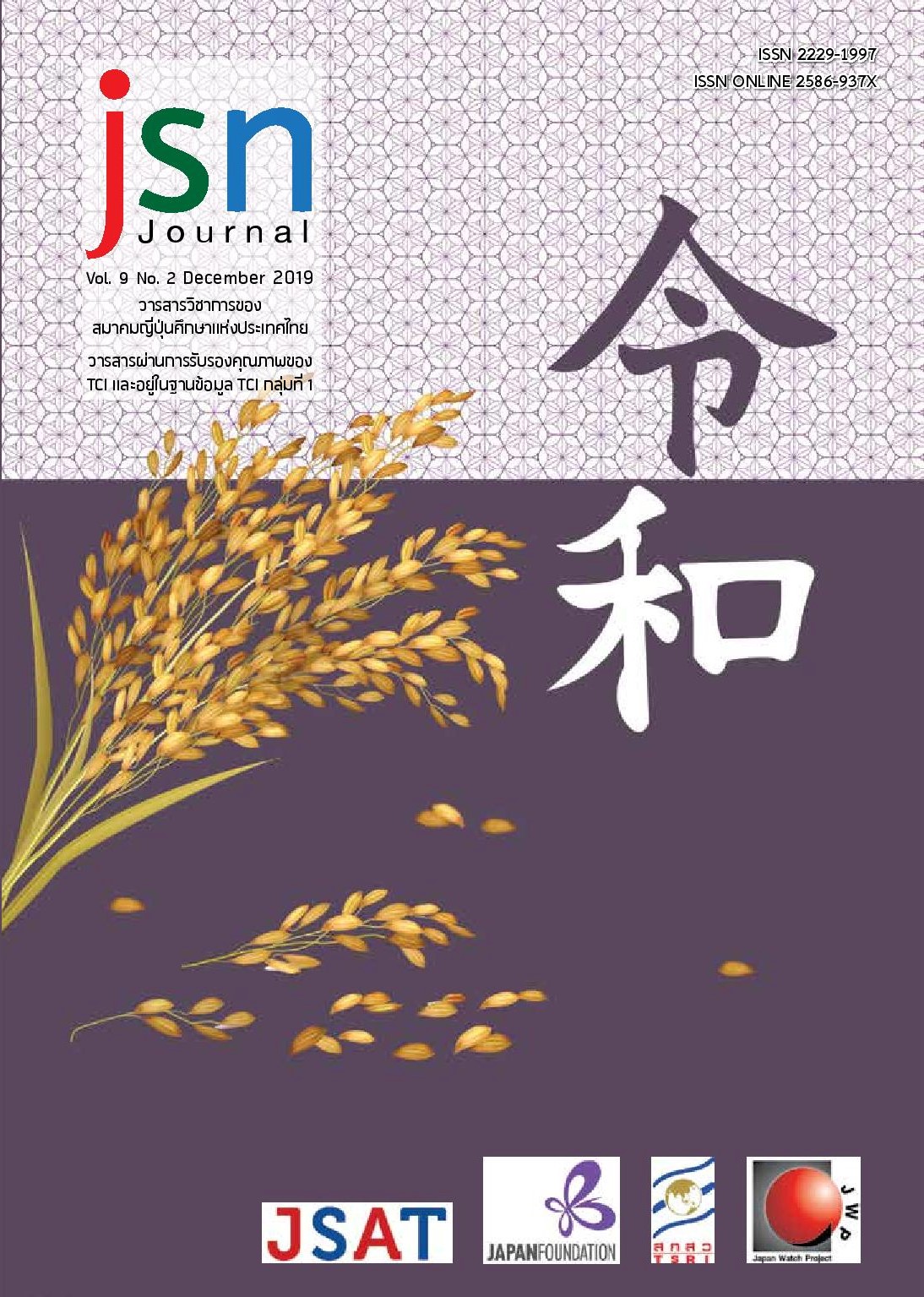The Beliefs and Expectations of Thai Learners of Japanese Concerning Their Japanese Classes, Japanese Teachers, and the Teachers’ Role
Main Article Content
Abstract
The objective of this research was to study Thai learners’ beliefs and expectations concerning their Japanese classes, Japanese teachers, and the teachers’ role. The target of this research was first- to fourth- year students enrolled in the Bachelor of Arts Program in Japanese at Kasetsart University. Ninety-five students participated in the study and the results were as follows.
The terms of "a good Japanese class" that most of the learners identified were “a class that enhanced the student’s Japanese language knowledge,” “a class in which the lecture was easy to understand,” “a class in which one felt comfortable and not stressed” in accordance with the idea of “a good Japanese teacher,” which was “a teacher that was good at teaching and where the explanations were easy to understand,” “a teacher that understood and accepted the students' way of thinking,” and “a teacher that made the class fun and not stressful.” Therefore, it can be said that Thai learners are fond of teachers that are kind, fun, easy to understand, and that prioritize the classroom atmosphere.
Regarding the learners’ beliefs about learning Japanese and the roles of the teacher, the study found that Thai learners give priority to learning about the Japanese culture, correct pronunciation skills, the learning of vocabulary and grammar, and using Japanese correctly. Furthermore, most of the learners expected the teacher to motivate and encourage the students. Additionally, it was felt that the teachers should manage the class so that it is fun. Further, the learners believed that learning with a native speaker is the best way to learn Japanese. Regarding the teachers’ language use, most of the learners agreed that Japanese teachers should primarily use the Japanese language, but they were not sure or disagreed that Thai teachers should use only the Thai language.
In terms of the expectations of the instructor and the language being used in the class, the study found that, one, the items that most of the learners expected to learn from a native Japanese teacher using the Japanese language as a medium of instruction were “Japanese pronunciation” and “Japanese conversation.” Second, the items that most of the learners expected to learn from Thai teachers, using the Thai language as a medium of instruction, were “grammar,” “Japanese literature,” “kanji,” and “translation/interpretation.” Meanwhile, approximately 40 to 50 percent of the students wanted the teachers to use half Japanese language and half Thai language in these courses. Three, the items that most of the learners expected from the team teaching of the Thai and Japanese teachers were “Japanese studies,” “Japanese for tourism/hotels,” “business Japanese,” “the comparative analysis of Japanese and Thai,” and “vocabulary.” Finally, fourth, the items regarding which the learners did not exactly express a preference for either a native Japanese teacher or Thai teacher were “writing” and “reading.”
Article Details
ข้อความและข้อคิดเห็นต่างๆ ในบทความเป็นของผู้เขียนบทความนั้นๆ ไม่ใช่ความเห็นของกองบรรณาธิการหรือของวารสาร jsn Journal
References
กมลทิพย์ พลบุตร. (2551). ความเชื่อของผู้เรียนเกี่ยวกับการเรียนภาษาญี่ปุ่น. วารสารมนุษยศาสตร์ มหาวิทยาลัยนเรศวร, 5 (2), 25-40.
ยุพกา ฟูกุชิม่า. (2554). ความเชื่อและกลยุทธ์การเรียนรู้ของนิสิตวิชาเอกภาษาญี่ปุ่นชาวไทย. มนุษยศาสตร์ ในทศวรรษใหม่: พลวัติแห่งองค์ความรู้กับพหุลักษณ์ทางวัฒนธรรม. คณะมนุษยศาสตร์ มหาวิทยาลัยเกษตรศาสตร์. 103-120.
ยุพกา ฟูกุชิม่า. (2562). ทัศนคติของผู้เรียนต่อการบรรยายด้วยภาษาญี่ปุ่นของผู้สอนชาวไทยในรายวิชาการ อ่านภาษาญี่ปุ่นขั้นสูง. วารสารเครือข่ายญี่ปุ่นศึกษา, 9(1), 25-48.
สมพร โกมารทัต. (2548). รายงานผลการวิจัยเรื่อง การศึกษาเปรียบเทียบวัฒนธรรมการสอนภาษาญี่ปุ่นในฐานะภาษาที่สอง ระหว่างมหาวิทยาลัยในประเทศไทยกับมหาวิทยาลัยในประเทศญี่ปุ่น. มหาวิทยาลัยธุรกิจบัณฑิตย์.
สำานักบริหารงานการมัธยมศึกษาตอนปลาย. (2559). แนวทางการจัดการเรียนรู้ในศตวรรษที่ 21 (Online). https://webs.rmutl.ac.th/assets/upload/files/2016/09/20160908101755_51855.
อรพินทร์ ชูชม. (2555). แรงจูงใจในการทำงาน: ทฤษฎีและการประยุกต์. วารสารจิตวิทยา มหาวิทยาลัย เกษมบัณฑิต, 2(2), 52-61.
อษัฎายทุธ ชศูร.ี (2012). การใชภ้าษาญปี่นุ่ในการบรรยายโดยผสู้อนชาวไทย กรณศีกึษาการสอนวชิาเนอื้หา ระดับกลาง-สูง ในจุฬาลงกรณ์มหาวิทยาลัย. วารสารเจแปนฟาวน์เดชั่น กรุงเทพฯ, 9, 139-144.
Atchara Aungtrakul.(2008).「外国語教師の役割に関するタイ人日本語学習者のビリーフ―大学 における日本語主専攻を対象として―」『日本語教育国際シンポジウム「東南アジアにおける 日本語教育の展望」予稿集』92-96.タマサート大学教養学部日本語学科.
池谷清美・Kanokwan Laohaburanakit KATAGIRI・片桐準二.(2012).「タイ国高等教育機関にお けるタイ人教師と日本人教師の協働観の比較―PAC分析からの考察―」『国際交流基金バンコク 日本文化センター日本語教育紀要』9, 29-38.
岡本和恵.(2010).「「ネイティブ」教師・「ノンネイティブ」教師の意識とその実践:ティー ム・ティーチングを通して見えてきたもの」『大阪日本語研究』22, 205-235.
カイザー・シュテファン.(1995).「ノンネイティブ日本語教師の役割―異文化間教育の現場とし ての日本語教室を目指して―」『筑波大学留学生センター日本語教育論集』10, 95-106.
カノックワン・ラオハブラナキット片桐.(2010).「日本人教師と協働したタイ人教師の体験と本 音―『正確さ』重視の「指導観」を中心に―」『大阪大学フォーラム2009報告書東南アジアに おける日本語・日本文化教育の21世紀的展望』40-46.大阪大学フォーラム2009実行委員会.
カノックワンラオハブラナキット片桐・池谷清美・片桐準二.(2016).「タイ人教師のコミュニケ ーションの仕方に出会った日本人教師の工夫とその過程―タイの大学の日本人教師のインタビ ューデータから― 」Japanese Studies Journal,33(1),17-31.
鹿目葉子・大橋真由美.(2017).「タイの日本企業が求める日本語人材育成に向けた日本語授業の 提案―タイの日本企業への日本語ニーズ調査から―」『言語教育研究』8, 25-34.
久保田美子.(2005).「ノンネイティブ日本語教師のビリーフ調査―指導内容、指導方法を中心と
ยุพกา ฟูกุชิม่า | Yupaka Fukushima した分析―」『応用言語学研究』7, 163-176.
久保田美子.(2017).「ノンネイティブ日本語教師のビリーフと学習経験―2004・2005年度と2014 ・2015年度の量的調査結果の比較―」『国際交流基金日本語教育紀要』13, 7-22.
幸銀眞.(2006).「日本国内の非母語話者日本語教師に対する学習者の変容―早稲田大学の初級実 践を通して―」『講座日本語教育』42, 60-81.早稲田大学日本語教育研究センター.
Saranya KONGJIT・吉田直子.(2012).「ティーム・ティーチングにおけるネイティブ教師とノン ネイティブ教師の役割分担―チェンマイ大学初級日本語クラスのタイ人学習者の期待―」『国 際交流基金バンコク日本文化センター日本語教育紀要』9, 129-138.
高橋雅子.(2015).「国内の日本語教育における非母語話者教師に関する考察―多文化共生社会に おける語学教師の多様性を問う―」『日本語教育実践研究』2, 104-113.
田中里奈.(2013).「日本語教育における「ネイティブ」/「ノンネイティブ」概念 言語学研究 および言語教育における関連文献のレビューから」『言語文化教育研究』11, 95-111.
縫部義憲他.(2006).「学習者が求める日本語教師の行動特性の構成概念」『日本語教員養成にお ける実践能力の育成と教育実習の理念に関する調査研究 平成16年度~平成17年度科学研究費 補助金基盤研究 (B) 研究成果報告書』(研究代表:中川良雄,課題番号:16320068) เข้าถึงได้จาก https://ir.lib.hiroshima.ac.jp/files/public/1/19900/20141016134410453195/Keken_16320068_ Nuibe.pdf
縫部義憲.(2010).「日本語教師が基本的に備えるべき力量・専門性とは何か」『日本語教育』144, 4-14.
横田隆志.(2013).「留学生の日本におけるノンネイティブ日本語教師に対する意識調査」2013 CAJLE Annual Conference Proceedings, 322-331.
横田隆志.(2017).「日本におけるノンネイティブ日本語教師に対する効果的な研修」『北陸大学 紀要』43, 75-86.
吉田一彦・芝崎理恵(2007).「母語話者教師と現地教師との協働モデル構築に向けて―モンゴル でできること、タイとの比較―」『アジアにおける日本語教育:外国語としての日本語修士課 程一周年セミナー論文集』89-102.チュラロンコン大学文学部東洋言語学科日本語講座.
冷麗敏.(2005).「中国の大学における「総合日本語(精読)」に関する意識調査―学習者と教師 の回答を比較して―」『日本言語文化研究会論集』創刊号, 59-73.


